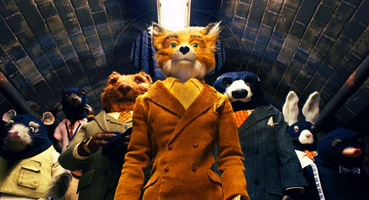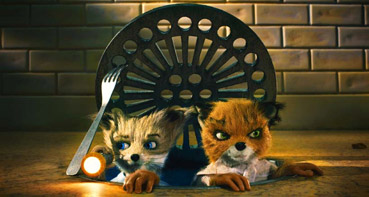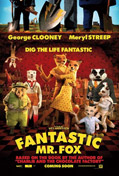"Anderson wanted a film that felt purposefully old-
fashioned and handmade. 'I didn't want it so much to
be more realistic,' he states. 'I wanted it to be more
ours.'
In that regard Anderson has succeeded
handsomely."
|
Interview with director Wes Anderson
Craig McLean, telegraph.co.uk |
I can't tell you how good it is to read those words despite the conceivable ambivalence of that last sentence. As CG drives cinematic perfection (yawn) ever forward, it's refreshing to hear that artists still want their untidy signatures all over their work. Wes Anderson's signature is writ large on Roald Dahl's Fantastic Mr. Fox and the story is enhanced at a cost that can easily be borne by this deceptively simple tale. A cunning fox outwits three grasping, bloodthirsty farmers. There really is not that much more to Dahl's story, charming as it is. Anderson has added a new opening, a new close, a change of locale, an emotional warmth and a depth to the animated characters making the whole much richer than its original parts. And Mr. Fox is so much more humanised despite his protestations of wildness. In the Dahl original, he wears a waistcoat and that's about it. In the movie, he's practically urbane and a man of letters no less. A friend of mine, on whose high horse I too was about to mount, reminded me of the story's quintessential Englishness. How absurd it would be to make it American! And then she found out who was playing Mr. Fox (gorgeous George) and the high horse bolted and national indignation melted away in the air accompanied by the mellifluous intonations of a certain Mr. Clooney.
For once, Americans rewriting essentially English literature get it right. They do this by serving the story and not making it 'x' or 'y', just Dahl's Fantastic Mr. Fox. It's not so much Americanised as placed in its own world with elements from the real world and not so much exclusively from the new world. Not sure what Dahl would have said about Bill Murray's badger-lawyer but, cuss me, it's still a joy. Anderson went to absurd lengths to placate the Dahl Estate and involve them in his own creative process. He wrote his screenplay staying with the Dahls and was rewarded with their complete confidence, one that was not misplaced. Old Roald was no slouch as a great writer of children's stories and I'm not suggesting that his 1970 story is deficient in any way but Mr. Fox's cinematic enhancements are welcome, at least from the perspective of a father who has to sit politely through some frankly uninspired children's fare what seems like every weekend. Fantastic Mr Fox doesn't belong in that asinine camp. For example, when did you last see a children's movie with the word 'existentialism' in it? My point, precisely. There is another aspect to the movie that demands recognition for its energetic, eclectic and almost dizzying contribution to Mr. Fox's success but I'll not mention that just yet.

Roald Dahl's work is often thrust forward as the epitome of edgy children's fiction. Critics and fans alike are swift to remind readers that there is real darkness in Dahl as there should be in worthwhile fiction. It's less well known that in the original Cinderella by the Brothers Grimm, Cinderella's mother exhorts one of her ugly daughters to cut off her toes so the golden slipper will fit – and yes, it was originally a golden slipper (a French author amended the tale and included the phrase "pantoufle de verre" – glass slipper. What? Apparently it's an urban myth that it was mistranslated from 'vair' meaning fur). Still, the mere idea of glass footwear is preposterous and it's to the power of our childhood indoctrination that we never even questioned it.
It's by understanding this level of wish-commitment and cruelty in a narrative that a child reaches important psychological landmarks. This is the central thesis of Bruno Bettleheim's terrific book, The Uses Of Enchantment. Children who are never presented with the darker aspects of the human (and presumably vulpine) condition logically grow up to be fearful and inward looking at the first sign of a shadow. This, of course, is generalised nonsense but there are a few stray motes of truth swirling in there somewhere. It's why nightmares are good for children. That said, I've just finished reading the Dahl original and with the exception of some very casual bird killing by our heroes and three bad guys of deliciously over the top odiousness, there's precious little dark in the original tale. By dark, I mean the dread that sets up shop in your hippocampus and internally bleeds out at the merest hint of potential danger.
So along comes Wes Anderson... At first I thought, "OK, Dahl stories have survived stranger creative pairings," and then I admitted to myself that this was a big fat lie. I mean, Wes Anderson... The Royal Tenenbaums, Rushmore and Life Aquatic Wes Anderson? Sheesh. But in injecting his own oft-worked through angst, he's created something very different. Don't go looking for Wallace and Gromit's exact and pleasing stop motion style. Nor will you find the off kilter fantasy of Coraline. What Anderson has delivered is awkward, jilting, puppet animation that not only looks a little rough around the edges but positively glows with pride at its own makeshiftiness. Did I mention it's beautifully directed with some close ups that elicit barked laughs? It's a much more contemplative affair though it never wants for action. The set pieces are made with loving gusto with old real world favourites denoting smoke and water – cotton wool and silver paper. There are no CG tweaks though I suspect that announcement is more marketing ploy than literal truth. In fact these days, there's no 'suspect' about it.
In essence, Mr. Fox's family is as dysfunctional as any other of Anderson's characters. There's the son who's striving for attention and any positive feedback from anyone as regards his self-appointed status of 'athlete'. He finds himself competing with not only his father but also a cousin who comes to stay, one of those perfect characters whose physical prowess is matched by their mental dexterity. Mr. Fox aches to live above ground and buys a property he can't afford on the estate of three farmers who couldn't be more disgusting if Dahl had tried. Mr. Fox makes a nuisance of himself behind his wife's back by making midnight raids and soon there's a price on his every limb. After an ambush and the loss of a body part, he takes the fight to the enemy. Perhaps the most under developed character in the piece is Mrs. Fox (the ubiquitous Meryl Streep replacing Care Blanchett and I'd love to know why). In the book, she's frailer but in the movie she's strong, a yardstick with standards that her husband has to live up to. His "I'm a wild animal!" is countered with "...and a husband and a father..." The movie succeeds in having it both ways, human and vulpine.

Once the tree is uprooted and the burrow breached Mr. Fox takes the fight to the farmers and by strategic digging is able to provide for his family and avoid the barrels of a shotgun, or sixty. Willem Dafoe excels as a slimy cider-guarding rat, drunk on what he's been charged to protect and in a death scene that is as moving as it's funny, he dies a hero's death (perhaps not a hero's – how about 'not a rat's'). The highlight from the multitude of other characters is Mr. Fox's assistant whose slug-slow mental processes get the biggest laughs of the movie. Ex-Simpsons alumnus (writer and producer) Wallace Wolodarsky's delivery as Kylie is suitably slow witted letting Mr. Clooney shine as the all too fantastic Mr. Fox.
And so to the element that stitched the whole show together, an element with so many different parts it seems nigh on miraculous it managed the feat. On the soundtrack CD, there are twelve different artists contributing to just twenty-four tracks. There is the brilliant (just on this score alone) contribution of Alexandre Desplat, the ringmaster and composer of the original cues. These are quirky in the best sense of the word and conjure up a unique sense of place and character that only good music can. The other artists range from Burl Ives to the Rolling Stones, Jarvis Cocker to the Beach Boys and all the way back to French composer Georges Delerue.
The latter gets name-checked for a very special reason. To rally the troops, Mr. Fox keeps a tape cued in his belt attached Walkman. As he pressed play, a piece of music emerged which was so familiar to me, it was like hearing an old friend's voice again after many years. I'd never been able to find out precisely what it had been called and now my mildest of frustrations was laid to rest. Originally written for François Truffat's superb La Nuit Americaine in 1973, the cue, 'Le Grand Choral', found its way into the consciousness of film-maker Mick Jackson. He directed one of the best television films ever made and used the piece extensively in a BBC Horizon special in 1987 charting the discovery of the structure of DNA, a landmark in science. Life Story was a revelation to me (how can molecular science be so damn exciting?) and that cue just summed up the longing and achievement against all the odds. So, fantastic, Mr. Fox! Thanks for that and the singular pleasures of your own story. |



